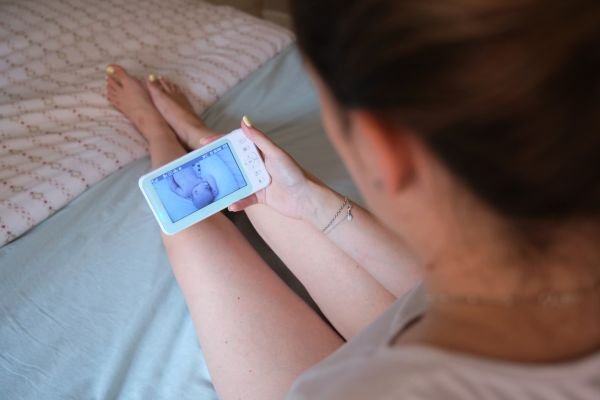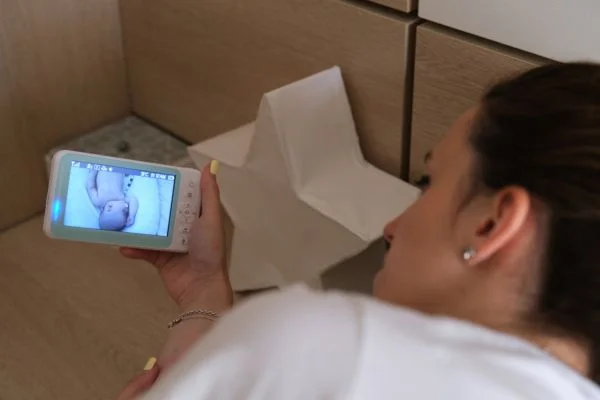The decision to stop using a baby monitor is one of the most significant milestones in parenthood. It can be an emotional experience, but it is also essential to know when the right time is to transition away from monitoring your little one’s sleep. In this blog post, we’ll break down the science behind at what age do you stop using a baby monitor and give practical advice about making the transition easier for everyone involved.
The Science Behind It
To figure out when you should stop using a baby monitor, it helps to understand why parents use them in the first place. The primary purpose of a baby monitor is safety.
It allows parents to keep an eye on their little ones while they are sleeping, which helps ensure that they are safe and secure at all times. It also provides peace of mind for parents worried about their child choking or getting stuck in something while asleep.
At What Age Do You Stop Using A Baby Monitor?
The age when parents should stop using a baby monitor varies widely depending on the individual child’s maturity level and behavior. Generally speaking, most children will be ready to transition away from needing a monitor by 12 months, though some may take up to 18 months or longer before reaching this milestone.
During this transition period, parents must start slowly reducing their reliance on the baby monitor and introducing more independence into their child’s sleeping routine. This could mean putting them down for naps without monitoring or having shorter periods where you leave them alone with only occasional checks via the baby monitor.
Also Read: When Did Baby Monitors Come Out?
Making the Transition Easier
Transitioning from relying on a baby monitor can be difficult for both parents and children. To make it easier, there are several things you can do:
• Get your child used to being in their own space – This means giving them plenty of opportunities during waking hours (such as playtime) where they can explore independently and get comfortable with being alone in their room or other areas of your home without needing constant supervision from adults.
• Create an easy-to-follow bedtime routine – Having an established nighttime routine helps children feel safe and secure as they get ready for bed each night, making it easier for them to fall asleep without needing parental assistance or monitoring every few minutes throughout the night.
• Give them plenty of reassurance – Make sure your child knows that you are always nearby if they need anything during the night; this will help alleviate any fears or anxieties about being alone during sleep.
Also Read: Can You Do Split Screen On Nanit Baby Monitor?
Do You Need A Baby Monitor If Baby Is In The Next Room?

Moving your baby into the next room can be an exciting milestone! No more having them beside you in the same room, but also knowing that they are safe and sound. But do you need to buy a baby monitor if they’re in the next room? Now we will explore some pros and cons of using a baby monitor to help parents make an informed decision.
Safety First – A baby monitor allows parents to easily keep an eye on their little one while in another room. It provides peace of mind, allowing parents to relax knowing their baby is safe and sound. Monitors come with various features like audio, video, motion & temperature sensors, two-way talk functions, and night vision capabilities, allowing even greater monitoring capabilities.
No More Worrying About Lost Sleep – With a baby monitor, parents can rest easy knowing that it will alert them if there is any issue or movement from their little one. That means that mom and dad can take shifts sleeping or catch up on sleep when needed without worrying about missing something or not hearing their little one stir from across the house.
Cost Considerations – Baby monitors are not cheap and come in all shapes and sizes. From simple audio monitors to high-tech models with night vision cameras, a wide range is available for every budget. Parents should research before making any purchase to ensure they find one that fits their needs and their budget.
Additionally, plan to use your monitor often when traveling or visiting friends/family. It may be worth investing in a model that has portability features, such as Wi-Fi-enabled models or ones with rechargeable batteries, so you don’t have to carry around cords wherever you go.
Also Read: Is Baby Monitor FSA Eligible?
Bottom Line:
So at what age do you stop using a baby monitor? Deciding when it’s time to stop using a baby monitor is never easy; however, understanding what age this milestone usually happens at and taking steps to make the transition process smoother can help make it less stressful for everyone involved.
Utilizing these tips can help ensure that your little one feels safe and secure as they move closer towards greater independence while providing comfort and reassurance whenever needed!

